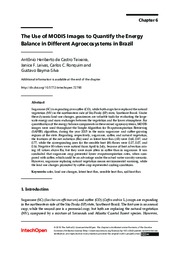The use of MODIS images to quantify the energy balance in different agroecosystems in Brazil.
The use of MODIS images to quantify the energy balance in different agroecosystems in Brazil.
Autoria: TEIXEIRA, A. H. de C.; LEIVAS, J. F.; RONQUIM, C. C.; SILVA, G. B. S. da
Resumo: Sugarcane (SC) is expanding over coffee (CO), while both crops have replaced the natural vegetation (NV) in the northeastern side of São Paulo (SP) state, Southeast Brazil. Under these dynamic land-use changes, geosciences are valuable tools for evaluating the largescale energy and mass exchanges between the vegetation and the lower atmosphere. For quantification of the energy balance components in these mixed agroecosystems, MODIS images were used throughout the Simple Algorithm for Evapotranspiration Retrieving (SAFER) algorithm, during the year 2015 in the main sugarcane- and coffee-growing regions of the state. Regarding, respectively, sugarcane, coffee, and natural vegetation, the fractions of the net radiation (Rn) used as latent heat flux (?E) were 0.68, 0.87, and 0.77, while the corresponding ones for the sensible heat (H) fluxes were 0.27, 0.07, and 0.16. Negative H values were noticed from April to July, because of heat advection raising ?E values above Rn, but they were more often in coffee than in sugarcane. It was concluded that sugarcane crop presented lower evapotranspiration rates, when compared with coffee, which could be an advantage under the actual water scarcity scenario. However, sugarcane replacing natural vegetation means environmental warming, while the land use changes promoted by coffee crop represented cooling conditions.
Ano de publicação: 2018
Tipo de publicação: Parte de livro (capítulos de livros, trabalhos e resumos publicados em anais ou em coletâneas)
Unidade: Embrapa Meio Ambiente
Observações
1 - Por padrão são exibidas publicações dos últimos 20 anos. Para encontrar publicações mais antigas, configure o filtro ano de publicação, colocando o ano a partir do qual você deseja encontrar publicações. O filtro está na coluna da esquerda na busca acima.
2 - Para ler algumas publicações da Embrapa (apenas as que estão em formato ePub), é necessário ter, no celular ou computador, um desses softwares gratuitos. Sistemas Android: Google Play Livros; IOS: iBooks; Windows e Linux: software Calibre.
Acesse outras publicações
Acesse a Base de Dados da Pesquisa Agropecuária (BDPA) para consultar o acervo completo das bibliotecas da Embrapa.

